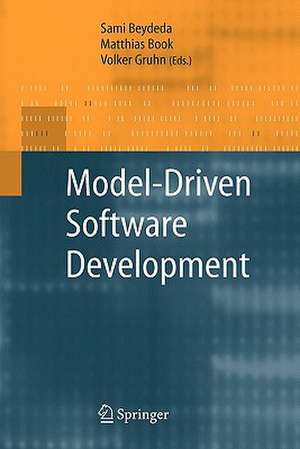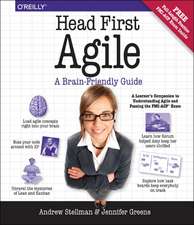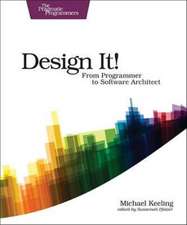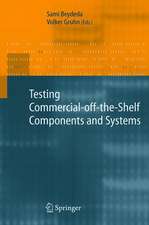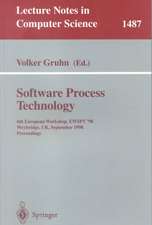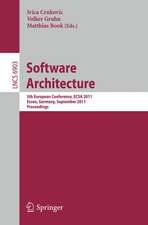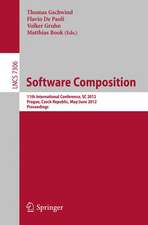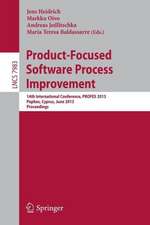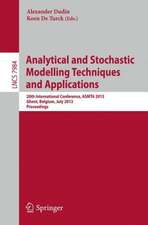Model-Driven Software Development
Editat de Sami Beydeda, Matthias Book, Volker Gruhnen Limba Engleză Paperback – 13 oct 2010
The aim of this book is to give an overview of the state of the art in model-driven software development. Achievements are considered from a conceptual point of view in the first part, while the second part describes technical advances and infrastructures. Finally, the third part summarizes experiences gained in actual projects employing model-driven development.
Beydeda, Book and Gruhn put together the results from leading researchers in this area, both from industry and academia. The result is a collection of papers which gives both researchers and graduate students a comprehensive overview of current research issues and industrial forefront practice, as promoted by OMG’s MDA initiative.
| Toate formatele și edițiile | Preț | Express |
|---|---|---|
| Paperback (1) | 996.07 lei 6-8 săpt. | |
| Springer Berlin, Heidelberg – 13 oct 2010 | 996.07 lei 6-8 săpt. | |
| Hardback (1) | 1001.49 lei 6-8 săpt. | |
| Springer Berlin, Heidelberg – 20 iul 2005 | 1001.49 lei 6-8 săpt. |
Preț: 996.07 lei
Preț vechi: 1245.09 lei
-20% Nou
Puncte Express: 1494
Preț estimativ în valută:
190.59€ • 198.100$ • 157.74£
190.59€ • 198.100$ • 157.74£
Carte tipărită la comandă
Livrare economică 05-19 aprilie
Preluare comenzi: 021 569.72.76
Specificații
ISBN-13: 9783642065026
ISBN-10: 3642065023
Pagini: 480
Ilustrații: XII, 464 p. 195 illus.
Dimensiuni: 155 x 235 x 25 mm
Greutate: 0.67 kg
Ediția:Softcover reprint of hardcover 1st ed. 2005
Editura: Springer Berlin, Heidelberg
Colecția Springer
Locul publicării:Berlin, Heidelberg, Germany
ISBN-10: 3642065023
Pagini: 480
Ilustrații: XII, 464 p. 195 illus.
Dimensiuni: 155 x 235 x 25 mm
Greutate: 0.67 kg
Ediția:Softcover reprint of hardcover 1st ed. 2005
Editura: Springer Berlin, Heidelberg
Colecția Springer
Locul publicării:Berlin, Heidelberg, Germany
Public țintă
ResearchDescriere
Abstraction is the most basic principle of software engineering. Abstractions are provided by models. Modeling and model transformation constitute the core of model-driven development. Models can be refined and finally be transformed into a technical implementation, i.e., a software system.
The aim of this book is to give an overview of the state of the art in model-driven software development. Achievements are considered from a conceptual point of view in the first part, while the second part describes technical advances and infrastructures. Finally, the third part summarizes experiences gained in actual projects employing model-driven development.
Beydeda, Book and Gruhn put together the results from leading researchers in this area, both from industry and academia. The result is a collection of papers which gives both researchers and graduate students a comprehensive overview of current research issues and industrial forefront practice, as promoted by OMG’s MDA initiative.
The aim of this book is to give an overview of the state of the art in model-driven software development. Achievements are considered from a conceptual point of view in the first part, while the second part describes technical advances and infrastructures. Finally, the third part summarizes experiences gained in actual projects employing model-driven development.
Beydeda, Book and Gruhn put together the results from leading researchers in this area, both from industry and academia. The result is a collection of papers which gives both researchers and graduate students a comprehensive overview of current research issues and industrial forefront practice, as promoted by OMG’s MDA initiative.
Cuprins
Part I - Conceptual Foundations of Model-Driven Development Models, Modeling, and Model-Driven Architecture (Brown, Conallen, Tropeano) A Systematic Lool at Model Transformations (Metzger) Tool Support for Model-Driven Development of Security Critical Systems with UML (Jürjens, Shabalin) Caste-Centric Modelling of Multi-Agent Systems: The CAMLE Modeling Language and Automated Tools (Zhu, Shan) Using Graph Transformation for Practical Model Driven Software Engineering (Grunske et. al.) A Generalized Notion of Platforms for Model Driven Development (Atkinson, Kühne) Part II - Technical Infrastructure of Model-Driven Development A Tool Infrastructure for Model-Driven Development Using Aspectual Patterns (Hammouda) Automatically Discovering Transitive Relationships in Class Diagrams (Egyed) Generic and Domain-Specific Model Refactoring using a Model Transformation Engine (Zhang, Lin, Gray) A Testing Framework for Model Transformations (Lin, Zhang, Gray) Parallax - An Aspect-Enabled Framework for Plugin-Based MDA Refinements Towards Middleware (Silaghi, Strohmeier) Evolution and Maintenance of MDA Applications (Seifert, Beneken) Part III - Case Studies Intents and Upgrades in Component-Based High-Assurance Systems (Elmquivst, Nadjm-Tehrani) On Modeling Techniques for Supporting Model Driven Development of Protocol Processing Applications (Alanen, Lilius, Porres, Truscan) An Integrated Model-Driven Development Environment for Composing and Vaklidating Distributed Real-Time and Embedded Systems (Trombetti et. al.) A Model-Driven Technique for Development of Embedded Systems Based on DEVS Formalism (Wainer, Glinsky, MacSween) Model Driven Service Engineering (Broek, Melby) Practical Insights into Model-Driven Architecture (Brown, Conallen, Tropeano)
Notă biografică
Sami Beydeda is an IT officer at the Federal Finance Office (Bundesamt füer Finanzen), Germany. His research interests besides model-driven development include software testing and component-based development. He has written his PhD thesis on "The Self-Testing COTS Components (STECC) Method". Sami Beydeda is a program committee co-chair of TECOS 2004, TQACBS 2005, program committee member of COMPSAC 2004, SEA 2004, QATWBA 2004, QATWBA 2005, TQACBS 2005.
Matthias Book is a research associate at the Chair of Applied Telematics / e-Business at the University of Leipzig in Germany. He is writing his PhD thesis on dialog flow control in web applications. His research interests include software engineering for distributed applications and especially model-driven design of web applications.
Volker Gruhn is a full professor at the computer science department of the University of Leipzig, Germany. His research interests are component-based development, software processes for distributed systems, architecture of electronic commerce applications and workflow management. He has been chief technical officer of a German software house called LION from 1992 to 1996. In this position he was responsible for a software development department of 150 people. Volker Gruhn was a PC member of major software engineering conferences (ESEC95, ESEC97, ICSE2004) and several software process workshops and conferences. He was program chair of the 6th European Workshop on Software Process Technology and the 8th European Software Engineering Conference. Volker Gruhn has already organized a workshop at ICSE, the Engineering Distributed Objects Workshop during ICSE 99. In 1997 Volker Gruhn co-founded adesso AG, a German software house specialized in component-based software development. adesso AG currently has 170 employees.
Matthias Book is a research associate at the Chair of Applied Telematics / e-Business at the University of Leipzig in Germany. He is writing his PhD thesis on dialog flow control in web applications. His research interests include software engineering for distributed applications and especially model-driven design of web applications.
Volker Gruhn is a full professor at the computer science department of the University of Leipzig, Germany. His research interests are component-based development, software processes for distributed systems, architecture of electronic commerce applications and workflow management. He has been chief technical officer of a German software house called LION from 1992 to 1996. In this position he was responsible for a software development department of 150 people. Volker Gruhn was a PC member of major software engineering conferences (ESEC95, ESEC97, ICSE2004) and several software process workshops and conferences. He was program chair of the 6th European Workshop on Software Process Technology and the 8th European Software Engineering Conference. Volker Gruhn has already organized a workshop at ICSE, the Engineering Distributed Objects Workshop during ICSE 99. In 1997 Volker Gruhn co-founded adesso AG, a German software house specialized in component-based software development. adesso AG currently has 170 employees.
Caracteristici
Includes supplementary material: sn.pub/extras
